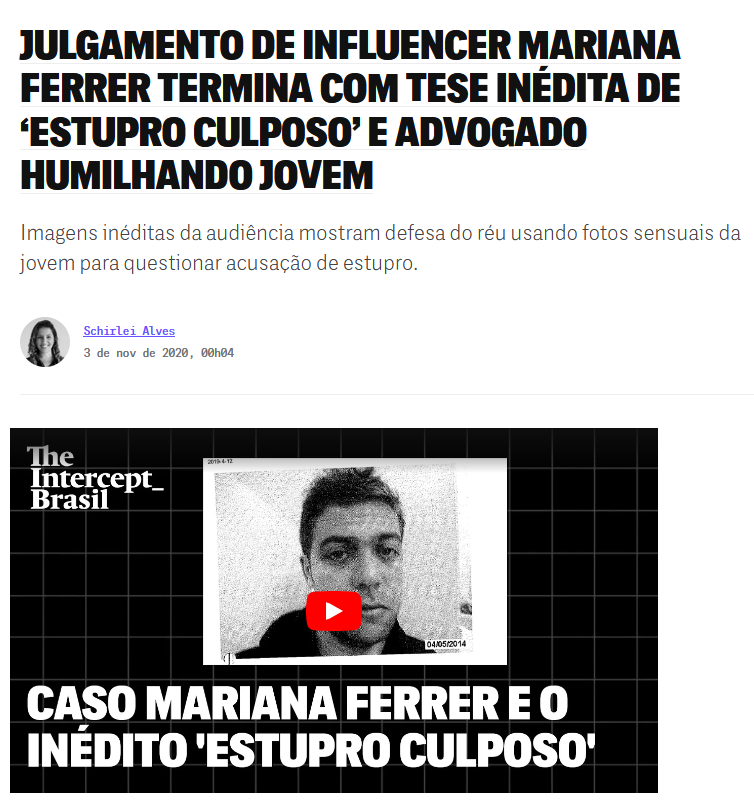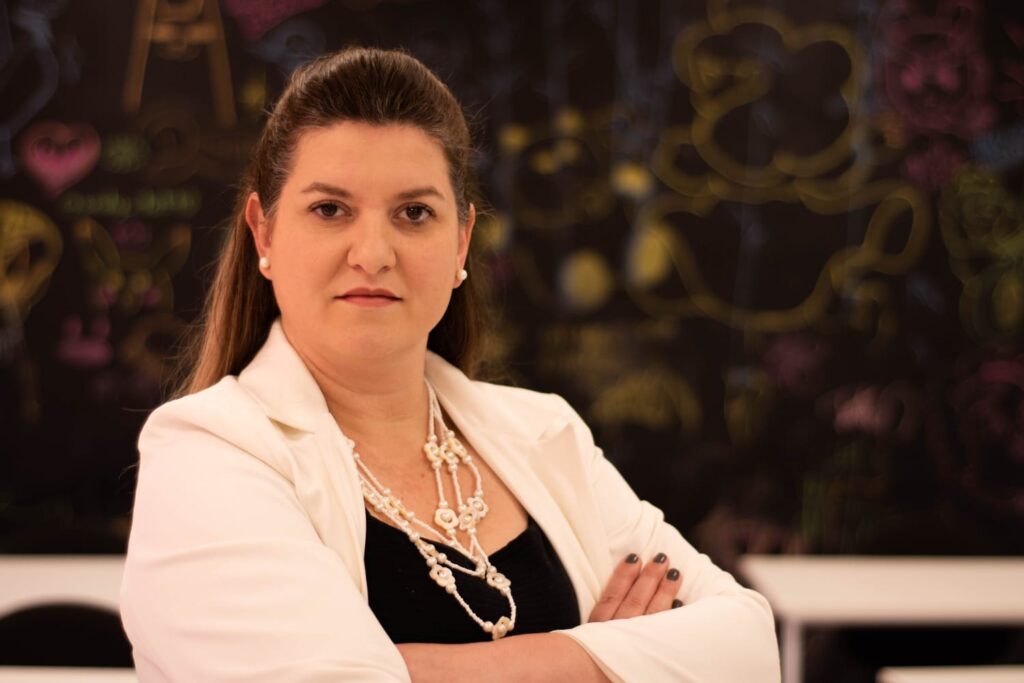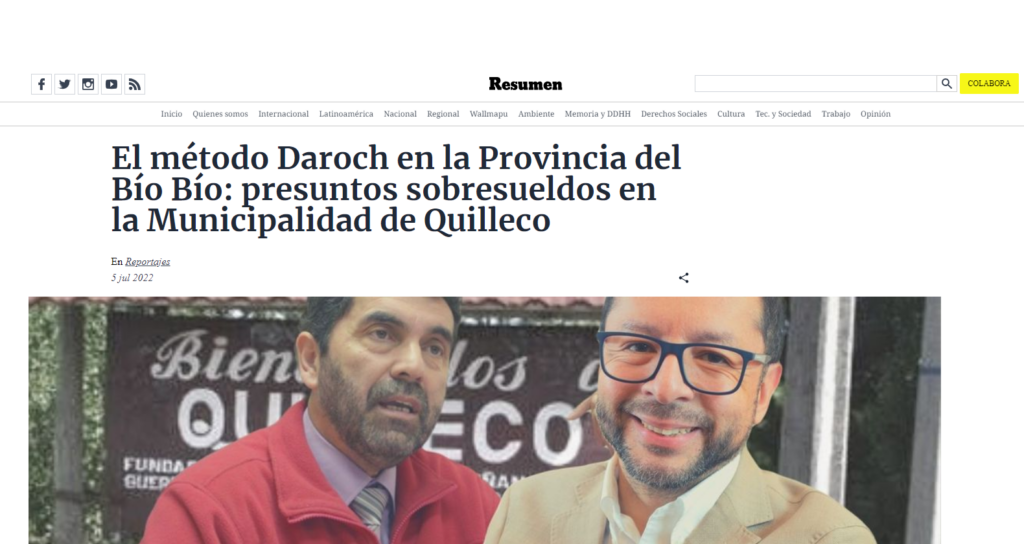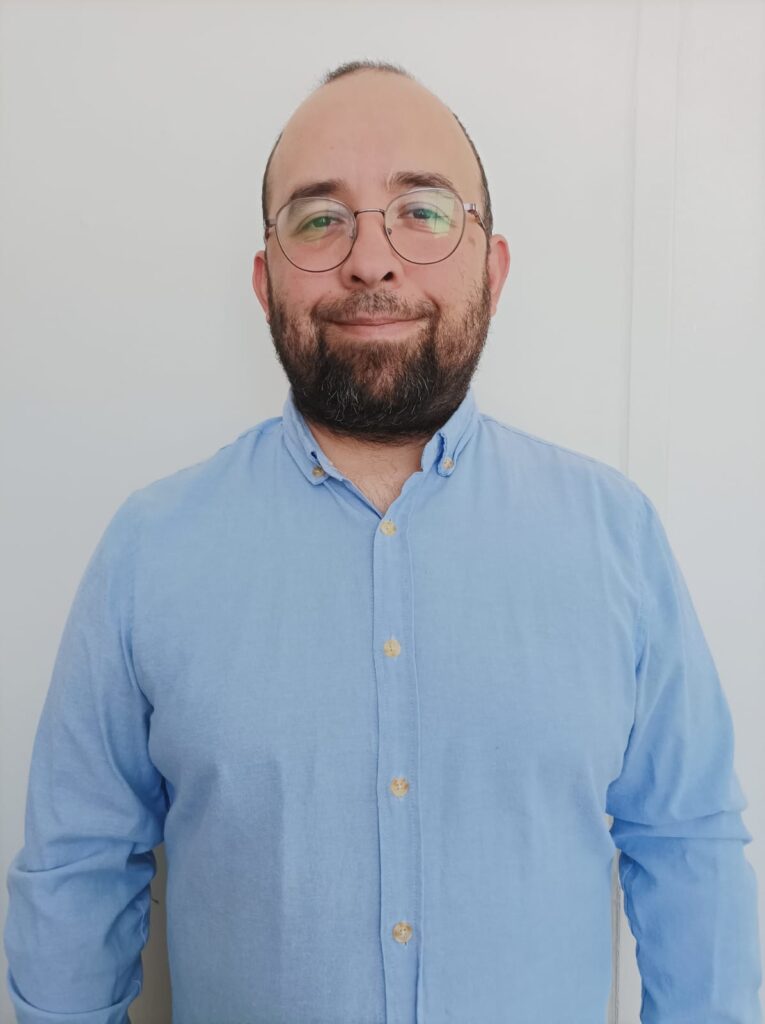In November 2020, Brazilian journalist Schirlei Alves wrote a feature story about how a young woman had been humiliated during the trial of the man accused and then acquitted of raping her two years earlier. The exposure of the case had great repercussions and prompted a wave of online attacks against Alves. It also resulted in the passing of a law to protect victims of violence and a sanction of the judge responsible for the case.
Yet, three years after the publication of this story, Alves was sentenced to one year under house arrest and to pay R$400,000 [about US $81,000] in damages to the judge and prosecutor, who had sued her criminally for defamation. Alves' case is the latest in Latin America to illustrate how the criminalization of defamation has an impact on the lives and work of journalists, and threatens press freedom and freedom of expression in the region.
Alves' conviction "redoubles our concern about the continuation of this type of legislation, which in reality ends up stifling the right to inform and, above all, journalistic investigation," Carlos Jornet, president of the Inter-American Press Association's (IAPA) Committee on Freedom of the Press and Information, told LatAm Journalism Review (LJR).
Jornet noted that the Declaration of Principles on Freedom of Expression of the Inter-American Commission on Human Rights (IACHR) "is very clear" on this issue. "Principle 10 states precisely that the protection of reputation should be guaranteed only through civil sanctions, i.e. criminal law should not be applied in these cases," he said.
According to the organization Media Defence, defamation "is broadly understood as the communication of a false statement that unjustly causes harm or detriment to a legal or natural person's reputation." The legal terms corresponding to defamation vary between countries, and can include calumnia, injuria and desacato – the latter is applied in cases of alleged offense against officials, institutions and public symbols.
Despite repeated recommendations from the IACHR and the United Nations (UN), and ongoing campaigns by civil society organizations for countries to remove defamation from their penal codes, UNESCO said the movement to decriminalize defamation in Latin American countries has stalled in recent years.
In the report "The 'misuse' of the judicial system to attack freedom of expression," UNESCO stated that between 1993 and 2012, at least 12 countries in Latin America and the Caribbean "repealed desacato laws and similar ones or abolished criminal defamation in relation to issues of public interest." However, defamation crimes persist in 29 countries in the region "and continue to be weaponized against journalists and bloggers."
Alves' article, published by the website Intercept Brasil on Nov. 3, 2020, included excerpts from a previously unpublished video recording of one of the hearings in the trial of wealthy businessman André de Camargo Aranha, which took place in July 2020. He was accused of having raped influencer Mariana Ferrer in 2018. The recording shows that, when questioning Ferrer, Aranha's defense lawyer, Cláudio Gastão da Rosa Filho, showed her sensual photos and said that he would "never have a daughter" of her "level" and that he "prayed to God" that his son wouldn't find "a woman like her." When he saw Ferrer crying, the lawyer said it was "fake crying" and “crocodile tears.”
Aranha was acquitted of rape in September 2020.

A report by Schirlei Alves published by the Intercept Brasil revealed details of the trial of the Mariana Ferrer case. (Screenshot)
After the publication of Alves’ reporting, prosecutor Thiago Carriço de Oliveira, judge Rudson Marcos and lawyer Rosa Filho filed criminal and civil lawsuits for defamation against Alves.
On Dec. 20, 2020, The Intercept was ordered by the court to edit Alves' report. The amended version of the article states that Oliveira “made clarifications and interventions” and that Marcos “made several interventions to maintain order, provide explanations to the victim and warn the defense lawyer” during the hearing. It also states that these facts “were omitted” in the portion of the recording of the hearing released by The Intercept.
In July 2023, Judge Andrea Cristina Rodrigues Studer, of the 5th Criminal Court of the District of Florianópolis, in the southern Brazilian state of Santa Catarina, acquitted Alves in the cases brought by lawyer Rosa Filho. According to news outlet Metrópoles, Studer acquitted the reporter stating that she was exercising her "freedom of expression" and did not overstep "press freedom’s limits," and that discussion is fundamental for a “plurality of ideas.”
However, two months later, Studer convicted Alves in the lawsuits filed by the judge and the prosecutor. They claimed the reporter had committed the crime of defamation by using the expression “negligent rape," which was not used at the hearing and is not included in the case file. The term appears in the article in reference to the prosecution's claim that Aranha had no way of knowing that Ferrer was not in a position to consent to the sexual act, and therefore there was no intent.
In an accompanying note published the same day as Alves' article, The Intercept's editors had stated that the expression "negligent rape" was used "to summarize the case and explain it to a lay audience." "This is a common journalistic device. At no time did The Intercept state that this term was used in the case," according to the statement.
In her ruling, Judge Studer stated that the use of the term "overstepped the line of narrative and journalistic criticism." She convicted Alves of "defamation against a public official, by reason of his functions, and by means that facilitated the disclosure of the case," according to a story by Agência Estado. The judge ordered the reporter to pay R$ 200,000 [about US $40,000] in damages to Judge Marcos and the same amount to prosecutor Oliveira, and to serve six months under house arrest for each case – R $400,000 [about US $81,000] and one year under house arrest total.
Alves’ reporting had national repercussions and led to the approval of law 14.321/2022, which became known as the Mariana Ferrer law. The law defines the crime of institutional violence and punishes public officials who intimidate or allow the intimidation of victims and witnesses of violent crimes. And in November 2023, the governmental body National Council of Justice (CNJ, by its Portuguese acronym) unanimously approved a warning for Judge Marcos about his role in this trial. According to CNJ, the judge "failed to restrict excessive behavior from the defendant’s lawyer.”
The Brazilian Association of Investigative Journalism (Abraji, by its Portuguese acronym) called Alves' conviction "inadmissible and outrageous," according to a statement signed by the organization and eight other groups. The Committee to Protect Journalists (CPJ), Reporters Without Borders (RSF) and the Voces del Sur Network, and The Coalition for Women in Journalism, which brings together organizations from 17 countries in Latin America, also expressed their condemnation of the sentence and called for it to be overturned.
Rafael Fagundes, a lawyer for The Intercept Brasil and Alves' defender in the case, said in a statement to LJR that "the Defense is dissatisfied with the sentence, which ignored the reality of the facts and the evidence in the case file, resulting in a flagrantly arbitrary and illegal decision."
According to him, "the sentence committed a series of elemental legal errors, artificially aggravating the conviction and contradicting all Brazilian jurisprudence on the subject." "Unable to hide corporatist concerns, this sentence can serve as a threat against those who dare to denounce abuses potentially committed by the Judiciary," Fagundes said. The defense has filed an appeal.
Katia Brembatti, president of Abraji, also pointed to "corporatism" in Alves' conviction and said that this "union" between forces in the judiciary to defend themselves was worrying. According to her, this case is part of a context of growing judicial harassment against journalists in Brazil.

Katia Brembatti, president of Abraji. (Courtesy)
"When you talk about judicial harassment, you always think of a flood of lawsuits against a journalist. But a single lawsuit, if it's very substantial, very intimidating, is capable of stifling journalists and making them stop talking about that subject," Brembatti said.
Abraji is working on proposing a model anti-SLAPP law in Brazil, she said, based on international parameters. One example is the general guideline established by the European Union in June this year to protect "journalists and human rights defenders from manifestly unfounded or abusive lawsuits." SLAPP stands for "strategic lawsuit against public participation," which are usually initiated by companies or people with institutional or financial power with the aim of silencing critics through judicial intimidation.
Brembatti also noted that judges in Brazil have the power not to accept "cases that are clearly intimidating." There is even a CNJ recommendation to courts to "adopt precautions aimed at curbing predatory judicialization that could lead to the curtailment of defense and the limitation of freedom of expression."
"This is a power that is in the hands of the Judiciary, and the Judiciary rarely uses it," she said.
Like Alves in Brazil, Chilean journalist Felipe Soto Cortés has also been living with a criminal conviction for defamation since January. He is the editor of the local media outlet Resumen, in the city of Concepción, 300 miles south of Santiago, the country's capital. Cortés was criminally convicted of defamation for a story published in July 2022 about the amassing of salaries in town halls in the province of Biobío.
In the text, he cites a report by the Comptroller General of the Republic which pointed out that Rodrigo Daroch, former national vice-president of the Party for Democracy (PPD, by its Spanish acronym) and then an official in the regional government of Biobío, had held dual jobs in two town governments in the region in 2021. The article used the expression “Daroch method” to refer to cases of other people holding parallel jobs in other town halls.

Politician Rodrigo Daroch has sued Felipe Soto Cortés following a report on the Resumen website. (Screenshot)
Daroch filed a criminal complaint for "grave injúria" against Soto Cortés, who in January was sentenced to 61 days in prison, to pay a fine equivalent to U.S. $822 and to be banned from holding public office during his sentence. As he has no criminal record, the prison sentence was replaced by a one-year probation, during which Soto Cortés must check-in at a police station every month.
Soto Cortés' defense has appealed the sentence and, while he awaits the outcome in court, he has been the target of two other similar lawsuits related to other stories, he told LJR.
"A defamation lawsuit is a power play rather than something to do with the truth," Soto Cortés said. “You end up being afraid, because finally you say 'to what extent can I bother them? To what extent can what I am going to say mean discomfort for them and they are going to chase me through the courts?' Then you often end up saying 'you know what, we’re not going to pursue this topic, let's toss it because we’re already facing a lawsuit.'”
A criminal conviction for defamation has this "silencing effect," Javier García, founder and president of the Observatorio del Derecho a la Comunicación (Observatory of the Right to Communication, or ODC), told LJR.
“From [the first] conviction you already know that in the second one the penalty will be effective or will be more intense, so the silencing effect exists (...) Moreover, the impact is not only against you — it’s on all your peers, because when you are convicted not only you are silenced, but also other journalists who say 'the same thing could happen to me.’ So it has a restraining effect on critical or denouncing voices,” García said.
Resumen has a team of eight journalists, according to Soto Cortés, and focuses on investigations into local authorities, such as town halls and the regional government. The self-censorship imposed by a fear of new lawsuits and convictions also affects the outlet's ability to finance itself, since Resumen is supported by contributions from subscribers, as well as funding by the journalists working at the outlet themselves.

Chilean journalist Felipe Soto Cortés. (Courtesy)
“We are a very tiny news outlet that is investigating things nobody else investigates,” Soto Cortes said. “When you censor yourself and stop investigating, the content you present in your newspaper is not very innovative, not very newsworthy, not very relevant, so your traffic goes down (...) It becomes a newspaper they’d like to have [the people who sue you]. That is, a newspaper that only publishes stories that are ready-to-go, press releases and that kind of thing. It becomes an innocuous, irrelevant outlet."
García said the Observatory's hypothesis is that local journalism is the main target of criminal defamation lawsuits in Chile.
“The powerful have avoided confronting the mainstream press, because there is a view that Chile has very good conditions of freedom of expression and aesthetically it looks ugly to pressure journalists,” he said. “What we’ve found is this more underground work, that looks for the weak, the vulnerable, those who will not cause public repercussions, those who will not have a corporate defense.”
García and the ODC are advising Soto Cortés' defense. One of the ways to reverse the journalist's conviction is a ruling by the Inter-American Court of Human Rights (I/A Court), released in February, which ruled that Chile is responsible for violating the right to freedom of expression of an environmental defender who was criminally convicted of defamation in 2004.
The international court's ruling stipulates, among other things, that the Chilean state “should establish alternatives to criminal proceedings for the protection of the honor of public officials with respect to opinions related to their performance in the public sphere.” It also says that until the decriminalization of defamation is completed in the country, “it is necessary that interpretations referring to cases involving suits for injúria (...) be in line with the principles established in the jurisprudence of this Court on freedom of expression.”
According to García, “for years, if not decades, the Inter-American Court has been setting out a very clear standard in which it says that the law, and especially criminal law, should not be used to harass journalists. Because this has not had any repercussions, I believe the Court has taken a more drastic measure, which is to state this in its jurisprudence.”
“This is a warning that the Inter-American Court is giving to the entire region, to all the countries of the region,” he said.